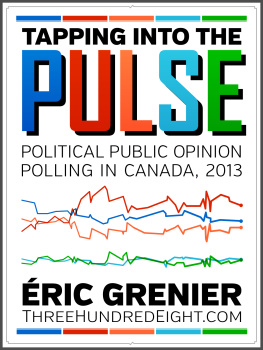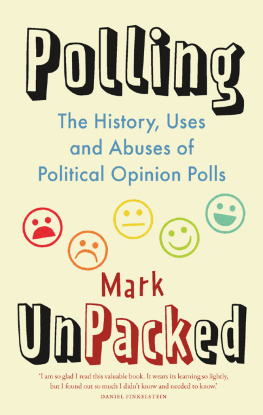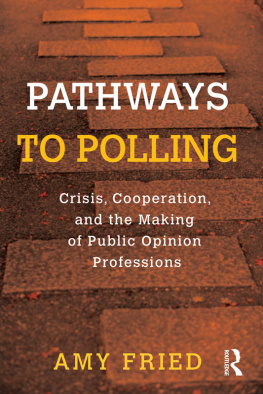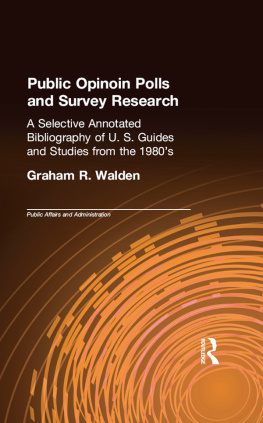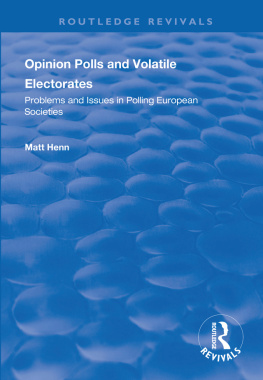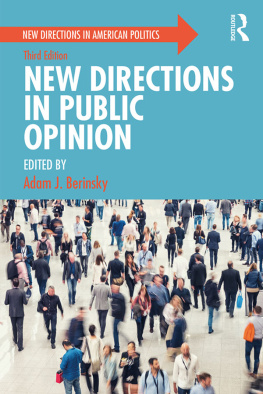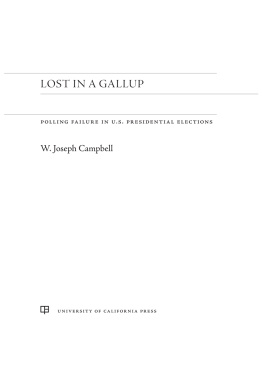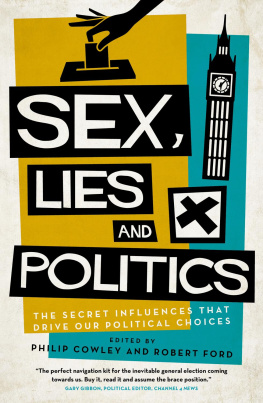EPUB Edition
Published by
IndieBookLauncher.com
ISBNs of editions for sale:
EPUB: 978-1-927967-04-1
Kindle: 978-1-927967-05-8
PDF: 978-1-927967-06-5
Copyright 2014 ric Grenier, all rights reserved.
Table of Contents
2013 Kickstarter Backers
Thank you!
The Crown ($500)
Flagship Solutions, Loonie Politics
Governor General ($250)
Linda M. Dial, Marc Henry
Natural Governing Party ($100)
Jay Payette, Dave Coletto, Justin Irwin, Nicholas, Environics Institute for Survey Research, Anonymous, Adrian Macaulay, Brian Lowry, Ryan Palmquist, Greg Vezina, John Preston, Edward Gaffney, Christopher Dye
Majority Government ($75)
Anthony Piscitelli, Owen Black, Thomas Barr, Jonathan Van Barneveld, Jacob Middleton, Luke OBrien, Geoff Ball, Paul Adams, Adam DuBourdieu, Jim Christopher, E. Peter McKinney
Minority Government ($50)
Chris Hannay, Serge Grenier, Kyle Hutton, Jess K. Zimmerman, Daniyar Kenzhebayev, Douglas Varley, Gerald Butts, Bruce Montador, Brendan Dahlinnolan, Jan Schotte, Warren Courtney, Cheryl Fullerton
Official Opposition ($30)
Lukas Dettlinger, Jessica Hertzog, Devon Paul, Lucie Laurion, Jonathan J. Weisman, Dave Shalala, Liam Roberts, Justin Ling, Warren Flood, Craig Saila, Judy, Mark Mitchell, Steven Joseph Lee, Donna Fong
Third Party Status ($20)
Brett Willemsen, Darryl R. Toews, Scott Gillard, Jared Phillips, Gordon Cogger, Matt Wadsworth, Michael Haack, John Turner, Rocky J. Martin, Yvan Champagne, Stephen Mattiussi, Barry, David Comeau, Shawn Kerr, XiBit Biggs, James Walker, John May, Andrew Brack, Nick, Darren Karasiuk, Sean Hayes, Christopher Green, Daniel Nowoselski, Tara Hunt, Don Macpherson, Philip Charbonneau, Ed Armstrong, Lukas Daniel Klausner, Nicki Doyle, Paul
Official Party Status ($10)
Jeremy Gillies, Ryan Campbell, Bryan Buchan, Martyn Johns, Pontifex Hieremias, Joe Krizmanic, Dillon McGee Waldron, Boris Gorzalka, Jim Rootham, Jon Simon, Douglas Feltham, Mathew Hupfield, Willie Campos, Rob Silver, Mark Calderaro, Marc Parsons, Haakon Sullivan, Hayden Moher, Jordan Owens, Matthew Angelus, Scott MacDonald, Chris Michalak, Tyler Meredith, Michael Martin, Michael Buttrey, Graham Adria, Andrew C. Morton, Dan Metes, Jim Ross, Peter Meldrum, Sharon, Tanner Watt, Myveryownwalrus, Karl Riley, An Michael Powell, Nick Penner, Scott McNeil, James Beirne, James McNish, Jay Silverman, Duncan Peterson, Philip Eckert, William Harrison, Farid Iskandar, Alex Apouchtine, Kevin Farris, David McGrane, Elias Tabello, Wesley Corbin, Robert Leamon, Colin ONeil, Enrique Colindres, Kevin Coles, David McVean, Yousef Hanna, Nazar Abbas, Tom Barrett, Tucker Doud, John Harrison, BJ Kilganan, Paul Sutton, Justin Cybulsky, Jeffrey Dillane, Christopher Lawson, Derek Tannis, Jarrett Holst, Alim Jiwa, Andrew Blacklock, Guillaume Turgeon, Grant Buckles, Bill McEachern, David Barrett, Rob McWhinney, Michael Chiarello, Konrad Zmitrowicz, Quinn Albaugh, Paul Lewkowicz, Nestor Daza, Christopher Scott, Alan Walker, Robert Nelson, J. Tremblay, Donald Hughes, Lucas Mitchell, Doug Bies, Justin Naugler, Nik Spohr, Matthew Starr, Karen, Liam Spencer, A. de Aguayo, Yvan Ltourneau, Darryl Bandoro, Ronan OBeirne, Zo Misiewicz, Felix Wan, Jonathan Rose, Michael, Jason Boileau, Krishna Anupindi, Jonathan McKay, Richard P. Fahlman, Jane Hilderman, Andrea Hosfield, Julien Chassin, Zac Belado, Brian Creamer, Samir Bashir, Zach Armstrong, Blaine Badiuk, Andrew Chan, Joe Phillips, Arthur Jack, Moberley, Sarah Braun, Shan Arora, Chris MacMillan, Kasper Swerts, Patrick McCaw, Shahin Yousefi, Scott Mason, Shaun Koerber, Michael Berenbaum, James Coccola, Adrian Del Balso, Daniel Atkinson, Russell Liu, Laura Beaulne-Stuebing

Member of Parliament ($5)
Julien Cotelesage, Charlie Pich, Carlton Solle, Michael Diaz
Foreword
Paul Adams
It must have been sometime in 2008. I was working at EKOS Research and the boss, Frank Graves, asked me, Who is this ric Grenier?
Grenier had popped up, seemingly from nowhere, asking surprisingly detailed questions about the methodology of our polls.
The reason that was unexpected was that while more and more political polls are published in the media every year, the scrutiny to which they are subjected is less than it has ever been, at least in my experience. And therein lies a story.
Polls have been an important, if controversial, part of our political landscape ever since they came along. With the dawn of the mass franchise, the old less formal political technique of tracking the electorate through human networks of local bosses with local knowledge proved inadequate. Parties and politicians searched for increasingly systematic tools to plumb the minds of the electorate, many of them borrowed from commercial market research. And the media naturally did so too.
In the United States, the Literary Digest magazine had experimented with predicting the presidential elections of the 1920s and 1930s, distributing literally millions of questionnaires and relying on people to mail in the completed forms. The survey results often came within one per cent of the actual national vote on election day. However, using the same method in 1936 the magazine wrongly predicted a win by the Republican Alf Landon. This was no doubt in part because magazine subscribers during the Depression were not particularly representative of the population and likely skewed away from poorer voters, for example, who were more likely to vote Democrat. Using more scientific methods, George Gallup correctly predicted that Franklin Roosevelt would be re-elected in 1936 based on just a thousand interviewsa fraction of what the Literary Digest had collected.
By the time of the Second World War, both Britain and Canada had branches of their propaganda machines actively sounding opinions among the public. George Gallup worked both sides of the street, signing up a chain of Canadian newspapers to publish his polls, but also contracting to do secret work for the government on wartime issues. On one occasion, the government prevailed on him to suppress polling intended for publication that revealed the depth of divisions among Canadians over conscription.
Of course, Gallup and other American pollsters famously got the 1948 election of Harry Truman wrongnot necessarily because of defects in their methods but likely because they stopped polling too soon and failed to catch a late shift in the electorate.That led to the famous photograph of Harry Truman holding a copy of the

